Deck 20: Electric Circuits
Question
Question
Question
Question
Question
Question
Question
Question
Question
Question
Question
Question
Question
Question
Question
Question
Question
Question
Question
Question
Question
Question
Question
Question
Question
Question
Question
Question
Question
Question
Question
Question
Question
Question
Question
Question
Question
Question
Question
Question
Question
Question
Question
Question
Question
Question
Question
Question
Question
Question
Question
Question
Question
Question
Question
Question
Question
Question
Question
Question
Question
Question
Question
Question
Question
Question
Question
Question
Question
Question
Question
Question
Question
Question
Question
Question
Question
Question
Question
Question

Unlock Deck
Sign up to unlock the cards in this deck!
Unlock Deck
Unlock Deck
1/100
Play
Full screen (f)
Deck 20: Electric Circuits
1
Which one of the following statements concerning resistance is true?
A)The resistance of a semiconductor increases with temperature.
B)Resistance is a property of resistors, but not conductors.
C)The resistance of a metal wire changes with temperature.
D)The resistance is the same for all samples of the same material.
E)The resistance of a wire is inversely proportional to the length of the wire.
A)The resistance of a semiconductor increases with temperature.
B)Resistance is a property of resistors, but not conductors.
C)The resistance of a metal wire changes with temperature.
D)The resistance is the same for all samples of the same material.
E)The resistance of a wire is inversely proportional to the length of the wire.
The resistance of a metal wire changes with temperature.
2
Complete the following statement: The electromotive force is
A)the maximum potential difference between the terminals of a battery.
B)the force that accelerates electrons through a wire when a battery is connected to it.
C)the force that accelerates protons through a wire when a battery is connected to it.
D)the maximum capacitance between the terminals of a battery.
E)the maximum electric potential energy stored within a battery.
A)the maximum potential difference between the terminals of a battery.
B)the force that accelerates electrons through a wire when a battery is connected to it.
C)the force that accelerates protons through a wire when a battery is connected to it.
D)the maximum capacitance between the terminals of a battery.
E)the maximum electric potential energy stored within a battery.
the maximum potential difference between the terminals of a battery.
3
The characteristics of five wires are given in the table.  The gauge is a measure of the diameter of the wire; and #18 corresponds to a diameter of 1.2 × 10-3 m; and #22 corresponds to a diameter of 6.4 × 10-4 m. The resistivity of iron is 9.7 × 10-8 . m; and the value for copper is 1.72 × 10-8 . m.
The gauge is a measure of the diameter of the wire; and #18 corresponds to a diameter of 1.2 × 10-3 m; and #22 corresponds to a diameter of 6.4 × 10-4 m. The resistivity of iron is 9.7 × 10-8 . m; and the value for copper is 1.72 × 10-8 . m.
-Which one of the wires carries the smallest current when they are connected to identical batteries?
A)wire E
B)wire D
C)wire C
D)wire B
E)wire A
 The gauge is a measure of the diameter of the wire; and #18 corresponds to a diameter of 1.2 × 10-3 m; and #22 corresponds to a diameter of 6.4 × 10-4 m. The resistivity of iron is 9.7 × 10-8 . m; and the value for copper is 1.72 × 10-8 . m.
The gauge is a measure of the diameter of the wire; and #18 corresponds to a diameter of 1.2 × 10-3 m; and #22 corresponds to a diameter of 6.4 × 10-4 m. The resistivity of iron is 9.7 × 10-8 . m; and the value for copper is 1.72 × 10-8 . m.-Which one of the wires carries the smallest current when they are connected to identical batteries?
A)wire E
B)wire D
C)wire C
D)wire B
E)wire A
wire A
4
Which one of the following statements concerning superconductors is false?
A)Below its critical temperature, the resistivity of a superconductor is zero -m.
B)Critical temperatures for some superconductors exceed 100 K.
C)All materials are superconducting at temperatures near absolute zero kelvin.
D)A constant current can be maintained in a superconducting ring for several years without an emf.
E)Superconductors are perfect conductors.
A)Below its critical temperature, the resistivity of a superconductor is zero -m.
B)Critical temperatures for some superconductors exceed 100 K.
C)All materials are superconducting at temperatures near absolute zero kelvin.
D)A constant current can be maintained in a superconducting ring for several years without an emf.
E)Superconductors are perfect conductors.

Unlock Deck
Unlock for access to all 100 flashcards in this deck.
Unlock Deck
k this deck
5
When a light bulb is connected to a 4.5 V battery, a current of 0.12 A passes through the bulb filament. What is the resistance of the filament?
A)440
B)28
C)9.3
D)1.4
E)38
A)440
B)28
C)9.3
D)1.4
E)38

Unlock Deck
Unlock for access to all 100 flashcards in this deck.
Unlock Deck
k this deck
6
Determine the length of a copper wire that has a resistance of 0.172 and cross-sectional area of 7.85 × 10-5 m2. The resistivity of copper is 1.72 × 10-8 . m.
A)873 m
B)250 m
C)78.5 m
D)785 m
E)6570 m
A)873 m
B)250 m
C)78.5 m
D)785 m
E)6570 m

Unlock Deck
Unlock for access to all 100 flashcards in this deck.
Unlock Deck
k this deck
7
Which one of the following quantities can be converted to kilowatt . hours (kWh)?
A)2.0 A
B)8.3 V
C)5.8 J
D)9.6 W
E)6.2 C/V
A)2.0 A
B)8.3 V
C)5.8 J
D)9.6 W
E)6.2 C/V

Unlock Deck
Unlock for access to all 100 flashcards in this deck.
Unlock Deck
k this deck
8
Which one of the following circuits has the largest resistance? 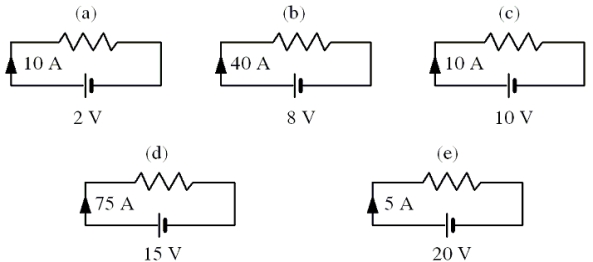
A)a
B)b
C)c
D)d
E)e

A)a
B)b
C)c
D)d
E)e

Unlock Deck
Unlock for access to all 100 flashcards in this deck.
Unlock Deck
k this deck
9
The resistivity of a silver wire with a radius of 5.04 × 10-4 m is 1.59 × 10-8 . m. If the length of the wire is 3.00 m, what is the resistance of the wire?
A)0.0598
B)47.0 µ
C)9.46 µ
D)0.167
E)1.88
A)0.0598
B)47.0 µ
C)9.46 µ
D)0.167
E)1.88

Unlock Deck
Unlock for access to all 100 flashcards in this deck.
Unlock Deck
k this deck
10
The potential difference across the ends of a wire is doubled in magnitude. If Ohm's law is obeyed, which one of the following statements concerning the resistance of the wire is true?
A)The resistance is one half of its original value.
B)The resistance is twice its original value.
C)The resistance is not changed.
D)The resistance increases by a factor of four.
E)The resistance decreases by a factor of four.
A)The resistance is one half of its original value.
B)The resistance is twice its original value.
C)The resistance is not changed.
D)The resistance increases by a factor of four.
E)The resistance decreases by a factor of four.

Unlock Deck
Unlock for access to all 100 flashcards in this deck.
Unlock Deck
k this deck
11
A 3.5-A current is maintained in a simple circuit with a total resistance of 1500 . What net charge passes through any point in the circuit during a thirty second interval?
A)100 C
B)180 C
C)500 C
D)600 C
E)5200 C
A)100 C
B)180 C
C)500 C
D)600 C
E)5200 C

Unlock Deck
Unlock for access to all 100 flashcards in this deck.
Unlock Deck
k this deck
12
A 4-A current is maintained in a simple circuit with a total resistance of 2 . How much energy is delivered in forty five seconds?
A)1440 J
B)96 J
C)360 J
D)720 J
E)240 J
A)1440 J
B)96 J
C)360 J
D)720 J
E)240 J

Unlock Deck
Unlock for access to all 100 flashcards in this deck.
Unlock Deck
k this deck
13
Which one of the following situations results in a conventional electric current that flows northward?
A)a beam of protons moves eastward
B)an electric dipole moves southward
C)a beam of electrons moves southward
D)a beam of electrons moves northward
E)a beam of protons moves northward
A)a beam of protons moves eastward
B)an electric dipole moves southward
C)a beam of electrons moves southward
D)a beam of electrons moves northward
E)a beam of protons moves northward

Unlock Deck
Unlock for access to all 100 flashcards in this deck.
Unlock Deck
k this deck
14
Which one of the following combinations of units is equivalent to the ohm?
A)V/C
B)A/J
C)J/s
D)J.s/C2
E)W/A
A)V/C
B)A/J
C)J/s
D)J.s/C2
E)W/A

Unlock Deck
Unlock for access to all 100 flashcards in this deck.
Unlock Deck
k this deck
15
Complete the following statement: The unit kilowatt . hour measures
A)current.
B)energy.
C)power.
D)potential drop.
E)voltage.
A)current.
B)energy.
C)power.
D)potential drop.
E)voltage.

Unlock Deck
Unlock for access to all 100 flashcards in this deck.
Unlock Deck
k this deck
16
The current through a certain heater wire is found to be fairly independent of its temperature. If the current through the heater wire is doubled, the amount of energy delivered by the heater in a given time interval will
A)increase by a factor of two.
B)decrease by a factor of two.
C)increase by a factor of four.
D)decrease by a factor of four.
E)increase by a factor of eight.
A)increase by a factor of two.
B)decrease by a factor of two.
C)increase by a factor of four.
D)decrease by a factor of four.
E)increase by a factor of eight.

Unlock Deck
Unlock for access to all 100 flashcards in this deck.
Unlock Deck
k this deck
17
How many electrons flow through a battery that delivers a current of 3.0 A for 12 s?
A)4.0 × 1020
B)3.6 × 1021
C)4.8 × 1015
D)6.4 × 1018
E)2.2 × 1020
A)4.0 × 1020
B)3.6 × 1021
C)4.8 × 1015
D)6.4 × 1018
E)2.2 × 1020

Unlock Deck
Unlock for access to all 100 flashcards in this deck.
Unlock Deck
k this deck
18
The characteristics of five wires are given in the table.  The gauge is a measure of the diameter of the wire; and #18 corresponds to a diameter of 1.2 × 10-3 m; and #22 corresponds to a diameter of 6.4 × 10-4 m. The resistivity of iron is 9.7 × 10-8 . m; and the value for copper is 1.72 × 10-8 . m.
The gauge is a measure of the diameter of the wire; and #18 corresponds to a diameter of 1.2 × 10-3 m; and #22 corresponds to a diameter of 6.4 × 10-4 m. The resistivity of iron is 9.7 × 10-8 . m; and the value for copper is 1.72 × 10-8 . m.
-Which one of the five wires has the largest resistance?
A)wire A
B)wire B
C)wire C
D)wire D
E)wire E
 The gauge is a measure of the diameter of the wire; and #18 corresponds to a diameter of 1.2 × 10-3 m; and #22 corresponds to a diameter of 6.4 × 10-4 m. The resistivity of iron is 9.7 × 10-8 . m; and the value for copper is 1.72 × 10-8 . m.
The gauge is a measure of the diameter of the wire; and #18 corresponds to a diameter of 1.2 × 10-3 m; and #22 corresponds to a diameter of 6.4 × 10-4 m. The resistivity of iron is 9.7 × 10-8 . m; and the value for copper is 1.72 × 10-8 . m.-Which one of the five wires has the largest resistance?
A)wire A
B)wire B
C)wire C
D)wire D
E)wire E

Unlock Deck
Unlock for access to all 100 flashcards in this deck.
Unlock Deck
k this deck
19
A physics student performed an experiment in which the potential difference V between the ends of a long straight wire was varied. The current I in the wire was measured at each value of the potential difference with an ammeter and the results of the experiment are shown in the table. 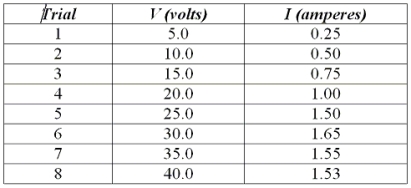 Which one of the following statements is the best conclusion based on the data?
Which one of the following statements is the best conclusion based on the data?
A)The resistance of the wire is 20 .
B)The wire does not obey Ohm's law.
C)The current in the wire is directly proportional to the applied potential difference.
D)The wire obeys Ohm's law over the range of potential differences between 5 and 30 V.
E)The wire obeys Ohm's law over the range of potential differences between 5 and 20 V.
 Which one of the following statements is the best conclusion based on the data?
Which one of the following statements is the best conclusion based on the data?A)The resistance of the wire is 20 .
B)The wire does not obey Ohm's law.
C)The current in the wire is directly proportional to the applied potential difference.
D)The wire obeys Ohm's law over the range of potential differences between 5 and 30 V.
E)The wire obeys Ohm's law over the range of potential differences between 5 and 20 V.

Unlock Deck
Unlock for access to all 100 flashcards in this deck.
Unlock Deck
k this deck
20
The characteristics of five wires are given in the table.  The gauge is a measure of the diameter of the wire; and #18 corresponds to a diameter of 1.2 × 10-3 m; and #22 corresponds to a diameter of 6.4 × 10-4 m. The resistivity of iron is 9.7 × 10-8 . m; and the value for copper is 1.72 × 10-8 . m.
The gauge is a measure of the diameter of the wire; and #18 corresponds to a diameter of 1.2 × 10-3 m; and #22 corresponds to a diameter of 6.4 × 10-4 m. The resistivity of iron is 9.7 × 10-8 . m; and the value for copper is 1.72 × 10-8 . m.
-Of the five wires, which one has the smallest resistance?
A)wire A
B)wire B
C)wire C
D)wire D
E)wire E
 The gauge is a measure of the diameter of the wire; and #18 corresponds to a diameter of 1.2 × 10-3 m; and #22 corresponds to a diameter of 6.4 × 10-4 m. The resistivity of iron is 9.7 × 10-8 . m; and the value for copper is 1.72 × 10-8 . m.
The gauge is a measure of the diameter of the wire; and #18 corresponds to a diameter of 1.2 × 10-3 m; and #22 corresponds to a diameter of 6.4 × 10-4 m. The resistivity of iron is 9.7 × 10-8 . m; and the value for copper is 1.72 × 10-8 . m.-Of the five wires, which one has the smallest resistance?
A)wire A
B)wire B
C)wire C
D)wire D
E)wire E

Unlock Deck
Unlock for access to all 100 flashcards in this deck.
Unlock Deck
k this deck
21
The figure shows variation of the current through the heating element with time in an iron when it is plugged into a standard 120 V, 60 Hz outlet. 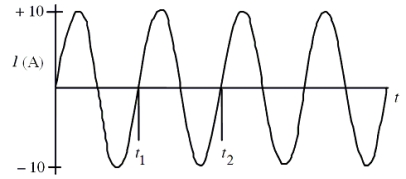
If t1 = 0.050 s, what is the value of t2? Note: The origin for the graph is not necessarily at t = 0 s.
A)0.067 s
B)0.079 s
C)0.10 s
D)0.60 s
E)61 s

If t1 = 0.050 s, what is the value of t2? Note: The origin for the graph is not necessarily at t = 0 s.
A)0.067 s
B)0.079 s
C)0.10 s
D)0.60 s
E)61 s

Unlock Deck
Unlock for access to all 100 flashcards in this deck.
Unlock Deck
k this deck
22
Complete the following statement: A simple series circuit contains a resistance R and an ideal battery. If a second resistor is connected in parallel with R,
A)the voltage across R will decrease.
B)the current through R will decrease.
C)the total current through the battery will increase.
D)the rate of energy dissipation in R will increase.
E)the equivalent resistance of the circuit will increase.
A)the voltage across R will decrease.
B)the current through R will decrease.
C)the total current through the battery will increase.
D)the rate of energy dissipation in R will increase.
E)the equivalent resistance of the circuit will increase.

Unlock Deck
Unlock for access to all 100 flashcards in this deck.
Unlock Deck
k this deck
23
A 75-W and 50-W incandescent light bulbs are designed for use with the same voltage. What is the ratio of the resistance of the 75-W bulb to the resistance of the 50-W bulb?
A)1.5
B)0.67
C)2.3
D)0.44
E)3.0
A)1.5
B)0.67
C)2.3
D)0.44
E)3.0

Unlock Deck
Unlock for access to all 100 flashcards in this deck.
Unlock Deck
k this deck
24
The figure shows variation of the current through the heating element with time in an iron when it is plugged into a standard 120 V, 60 Hz outlet. 
-What is the resistance of the iron?
A)24
B)7.1
C)17
D)12
E)1.8

-What is the resistance of the iron?
A)24
B)7.1
C)17
D)12
E)1.8

Unlock Deck
Unlock for access to all 100 flashcards in this deck.
Unlock Deck
k this deck
25
A computer monitor uses 1.5 A of current when it is plugged into a 120 V outlet. The monitor is never turned off. What is the yearly cost of operating the monitor if the cost of electricity is $0.14/kWh?
A)$ 64
B)$ 81
C)$ 110
D)$ 190
E)$ 220
A)$ 64
B)$ 81
C)$ 110
D)$ 190
E)$ 220

Unlock Deck
Unlock for access to all 100 flashcards in this deck.
Unlock Deck
k this deck
26
The figure shows variation of the current through the heating element with time in an iron when it is plugged into a standard 120 V, 60 Hz outlet. 
What is the rms value of the current in this circuit?
A)1.4 A
B)7.1 A
C)11 A
D)14 A
E)18 A

What is the rms value of the current in this circuit?
A)1.4 A
B)7.1 A
C)11 A
D)14 A
E)18 A

Unlock Deck
Unlock for access to all 100 flashcards in this deck.
Unlock Deck
k this deck
27
A 3.0-A current is maintained in a simple circuit that consists of a resistor between the terminals of an ideal battery. If the battery supplies energy at a rate of 25 W, how large is the resistance?
A)0.40
B)0.80
C)2.4
D)4.2
E)8.8
A)0.40
B)0.80
C)2.4
D)4.2
E)8.8

Unlock Deck
Unlock for access to all 100 flashcards in this deck.
Unlock Deck
k this deck
28
The figure shows variation of the current through the heating element with time in an iron when it is plugged into a standard 120 V, 60 Hz outlet. 
What is the peak voltage?
A)10 V
B)60 V
C)120 V
D)170 V
E)240 V

What is the peak voltage?
A)10 V
B)60 V
C)120 V
D)170 V
E)240 V

Unlock Deck
Unlock for access to all 100 flashcards in this deck.
Unlock Deck
k this deck
29
Some light bulbs are connected in parallel to a 120 V source as shown in the figure. Each bulb dissipates an average power of 60 W. The circuit has a fuse F that burns out when the current in the circuit exceeds 9 A. Determine the largest number of bulbs, which can be used in this circuit without burning out the fuse. 
A)9
B)17
C)25
D)34
E)36

A)9
B)17
C)25
D)34
E)36

Unlock Deck
Unlock for access to all 100 flashcards in this deck.
Unlock Deck
k this deck
30
A resistor dissipates 1.5 W when it is connected to a battery with a potential difference of 12 V. What is the resistance of the resistor?
A)0.13
B)220
C)18
D)8.0
E)96
A)0.13
B)220
C)18
D)8.0
E)96

Unlock Deck
Unlock for access to all 100 flashcards in this deck.
Unlock Deck
k this deck
31
Three 15- and two 25- light bulbs and a 24 V battery are connected in a series circuit. What is the current that passes through each bulb?
A)0.18 A
B)0.25 A
C)0.51 A
D)0.74 A
E)The current will be 1.6 A in the 15- bulbs and 0.96 A in the 25- bulbs.
A)0.18 A
B)0.25 A
C)0.51 A
D)0.74 A
E)The current will be 1.6 A in the 15- bulbs and 0.96 A in the 25- bulbs.

Unlock Deck
Unlock for access to all 100 flashcards in this deck.
Unlock Deck
k this deck
32
Which one of the following statements concerning resistors in series is true?
A)The voltage across each resistor is the same.
B)The current through each resistor is the same.
C)The power dissipated by each resistor is the same.
D)The rate at which charge flows through each resistor depends on its resistance.
E)The total current through the resistors is the sum of the current through each resistor.
A)The voltage across each resistor is the same.
B)The current through each resistor is the same.
C)The power dissipated by each resistor is the same.
D)The rate at which charge flows through each resistor depends on its resistance.
E)The total current through the resistors is the sum of the current through each resistor.

Unlock Deck
Unlock for access to all 100 flashcards in this deck.
Unlock Deck
k this deck
33
A lamp uses an average power of 55 W when it is connected to an rms voltage of 120 V. Which entry in the following table is correct for this circuit? 
A)
B)
C)
D)
E)

A)

B)

C)

D)

E)


Unlock Deck
Unlock for access to all 100 flashcards in this deck.
Unlock Deck
k this deck
34
Three resistors, 50- , 120- , 180- , are connected in series in a circuit. What is the equivalent resistance of this combination of resistors?
A)350
B)250
C)200
D)120
E)29
A)350
B)250
C)200
D)120
E)29

Unlock Deck
Unlock for access to all 100 flashcards in this deck.
Unlock Deck
k this deck
35
Two wires, A and B, and a variable resistor, R, are connected in series to a battery. Which one of the following results will occur if the resistance of R is increased?
A)The current through A and B will increase.
B)The voltage across A and B will increase.
C)The voltage across the entire circuit will increase.
D)The power used by the entire circuit will increase.
E)The current through the entire circuit will decrease.
A)The current through A and B will increase.
B)The voltage across A and B will increase.
C)The voltage across the entire circuit will increase.
D)The power used by the entire circuit will increase.
E)The current through the entire circuit will decrease.

Unlock Deck
Unlock for access to all 100 flashcards in this deck.
Unlock Deck
k this deck
36
An ac current has an rms value of 3.54 A. Determine the peak value of the current.
A)1.25 A
B)2.50 A
C)3.75 A
D)5.00 A
E)7.08 A
A)1.25 A
B)2.50 A
C)3.75 A
D)5.00 A
E)7.08 A

Unlock Deck
Unlock for access to all 100 flashcards in this deck.
Unlock Deck
k this deck
37
The figure shows variation of the current through the heating element with time in an iron when it is plugged into a standard 120 V, 60 Hz outlet. 
What is the approximate average power dissipated in the iron?
A)450 W
B)600 W
C)850 W
D)1200 W
E)1700 W

What is the approximate average power dissipated in the iron?
A)450 W
B)600 W
C)850 W
D)1200 W
E)1700 W

Unlock Deck
Unlock for access to all 100 flashcards in this deck.
Unlock Deck
k this deck
38
A 220- resistor is connected across an ac voltage source V = (150 V) sin [2 (60 Hz)t]. What is the average power delivered to this circuit?
A)51 W
B)110 W
C)280 W
D)320 W
E)550 W
A)51 W
B)110 W
C)280 W
D)320 W
E)550 W

Unlock Deck
Unlock for access to all 100 flashcards in this deck.
Unlock Deck
k this deck
39
A 4.5-V battery is connected to two resistors connected in series as shown in the drawing. Determine the total power dissipated in the resistors. 
A)0.033 W
B)0.090 W
C)0.15 W
D)0.60 W
E)4.7 W

A)0.033 W
B)0.090 W
C)0.15 W
D)0.60 W
E)4.7 W

Unlock Deck
Unlock for access to all 100 flashcards in this deck.
Unlock Deck
k this deck
40
When a 1500-W hair dryer is in use, the current passing through the dryer may be represented as I = (17.7A) sin (120 t). What is the rms current for this circuit?
A)17.7 A
B)12.5 A
C)85.7 A
D)25.0 A
E)8.85 A
A)17.7 A
B)12.5 A
C)85.7 A
D)25.0 A
E)8.85 A

Unlock Deck
Unlock for access to all 100 flashcards in this deck.
Unlock Deck
k this deck
41
Three resistors are placed in a circuit as shown. The potential difference between points A and B is 30 V. 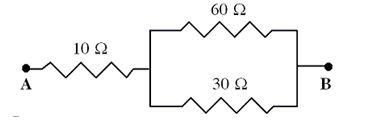
-What is the equivalent resistance between the points A and B?
A)10
B)20
C)30
D)50
E)100

-What is the equivalent resistance between the points A and B?
A)10
B)20
C)30
D)50
E)100

Unlock Deck
Unlock for access to all 100 flashcards in this deck.
Unlock Deck
k this deck
42
Three resistors are connected in a circuit as shown. Using Kirchhoff's rules, determine the current in one of the 16- resistors. 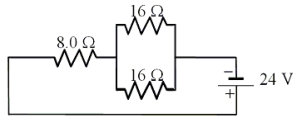
A)0.50 A
B)0.75 A
C)1.0 A
D)1.3 A
E)2.0 A

A)0.50 A
B)0.75 A
C)1.0 A
D)1.3 A
E)2.0 A

Unlock Deck
Unlock for access to all 100 flashcards in this deck.
Unlock Deck
k this deck
43
A battery has a terminal voltage of 12 V when no current flows and an internal resistance of 2 . The battery is placed in series with a 1- resistor. Which one of the entries in the following table is correct?

A)
B)
C)
D)
E)

A)

B)

C)

D)

E)


Unlock Deck
Unlock for access to all 100 flashcards in this deck.
Unlock Deck
k this deck
44
Three resistors and two 10.0-V batteries are arranged as shown in the circuit diagram. Which one of the following entries in the table is correct? 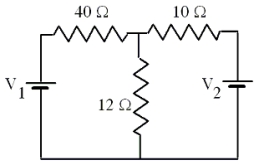

A)
B)
C)
D)
E)


A)

B)

C)

D)

E)


Unlock Deck
Unlock for access to all 100 flashcards in this deck.
Unlock Deck
k this deck
45
Three resistors are placed in a circuit as shown. The potential difference between points A and B is 30 V. 
-What is the potential drop across the 30- resistor?
A)10 V
B)20 V
C)30 V
D)60 V
E)100 V

-What is the potential drop across the 30- resistor?
A)10 V
B)20 V
C)30 V
D)60 V
E)100 V

Unlock Deck
Unlock for access to all 100 flashcards in this deck.
Unlock Deck
k this deck
46
Three resistors are placed in a circuit as shown. The potential difference between points A and B is 30 V. 
-What is the current through the 30- resistor?
A)0.3 A
B)0.5 A
C)0.7 A
D)1 A
E)2 A

-What is the current through the 30- resistor?
A)0.3 A
B)0.5 A
C)0.7 A
D)1 A
E)2 A

Unlock Deck
Unlock for access to all 100 flashcards in this deck.
Unlock Deck
k this deck
47
Five resistors are connected as shown. What is the equivalent resistance between points A and B? 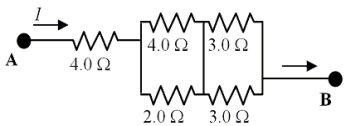
A)6.8
B)9.2
C)3.4
D)2.1
E)16

A)6.8
B)9.2
C)3.4
D)2.1
E)16

Unlock Deck
Unlock for access to all 100 flashcards in this deck.
Unlock Deck
k this deck
48
A non-ideal battery has a 6.0-V emf and an internal resistance of 0.6 . Determine the terminal voltage when the current drawn from the battery is 0.5 A.
A)5.0 V
B)6.0 V
C)5.4 V
D)6.6 V
E)5.7 V
A)5.0 V
B)6.0 V
C)5.4 V
D)6.6 V
E)5.7 V

Unlock Deck
Unlock for access to all 100 flashcards in this deck.
Unlock Deck
k this deck
49
Four resistors and a 6-V battery are arranged as shown in the circuit diagram. 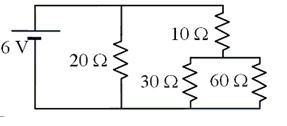
-The smallest current passes through which resistor(s)?
A)the 10- resistor
B)the 20- resistor
C)the 30- resistor
D)the 60- resistor
E)It is the same and the smallest in the 30- and 60- resistors.

-The smallest current passes through which resistor(s)?
A)the 10- resistor
B)the 20- resistor
C)the 30- resistor
D)the 60- resistor
E)It is the same and the smallest in the 30- and 60- resistors.

Unlock Deck
Unlock for access to all 100 flashcards in this deck.
Unlock Deck
k this deck
50
Jason's circuit has a 24- resistor that is connected in series to two 12- resistors that are connected in parallel. JoAnna's circuit has three identical resistors wired in parallel. If the equivalent resistance of Jason's circuit is the same as that of JoAnna's circuit, determine the value of JoAnna's resistors.
A)90
B)48
C)30
D)24
E)12
A)90
B)48
C)30
D)24
E)12

Unlock Deck
Unlock for access to all 100 flashcards in this deck.
Unlock Deck
k this deck
51
What is the total power dissipated in the two resistors in the circuit shown? 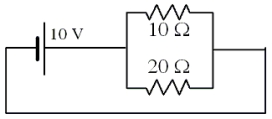
A)10 W
B)15 W
C)33 W
D)67 W
E)670 W

A)10 W
B)15 W
C)33 W
D)67 W
E)670 W

Unlock Deck
Unlock for access to all 100 flashcards in this deck.
Unlock Deck
k this deck
52
Three resistors are connected as shown in the figure. The potential difference between points A and B is 26 V. 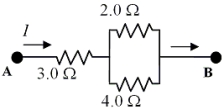
-How much current flows through the 2- resistor?
A)2.0 A
B)4.0 A
C)6.0 A
D)8.7 A
E)10.0 A

-How much current flows through the 2- resistor?
A)2.0 A
B)4.0 A
C)6.0 A
D)8.7 A
E)10.0 A

Unlock Deck
Unlock for access to all 100 flashcards in this deck.
Unlock Deck
k this deck
53
Three resistors are connected as shown in the figure. The potential difference between points A and B is 26 V. 
-How much current flows through the 3- resistor?
A)2.0 A
B)4.0 A
C)6.0 A
D)8.7 A
E)10.0 A

-How much current flows through the 3- resistor?
A)2.0 A
B)4.0 A
C)6.0 A
D)8.7 A
E)10.0 A

Unlock Deck
Unlock for access to all 100 flashcards in this deck.
Unlock Deck
k this deck
54
Four resistors and a 6-V battery are arranged as shown in the circuit diagram. 
-Determine the equivalent resistance for this circuit.
A)50
B)120
C)29
D)5
E)12

-Determine the equivalent resistance for this circuit.
A)50
B)120
C)29
D)5
E)12

Unlock Deck
Unlock for access to all 100 flashcards in this deck.
Unlock Deck
k this deck
55
Two resistors are arranged in a circuit that carries a total current of 15 A as shown in the figure. Which one of the entries in the following table is correct? 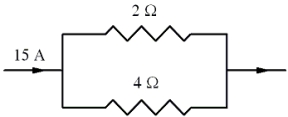

A)
B)
C)
D)
E)


A)

B)

C)

D)

E)


Unlock Deck
Unlock for access to all 100 flashcards in this deck.
Unlock Deck
k this deck
56
Four resistors and a 6-V battery are arranged as shown in the circuit diagram. 
-The largest potential difference is across which resistor(s)?
A)the 10- resistor
B)the 20- resistor
C)the 30- resistor
D)the 60- resistor
E)It is the same and the largest for the 30- and 60- resistors.

-The largest potential difference is across which resistor(s)?
A)the 10- resistor
B)the 20- resistor
C)the 30- resistor
D)the 60- resistor
E)It is the same and the largest for the 30- and 60- resistors.

Unlock Deck
Unlock for access to all 100 flashcards in this deck.
Unlock Deck
k this deck
57
Three resistors are placed in a circuit as shown. The potential difference between points A and B is 30 V. 
-What is the potential drop across the 10- resistor?
A)10 V
B)20 V
C)30 V
D)60 V
E)100 V

-What is the potential drop across the 10- resistor?
A)10 V
B)20 V
C)30 V
D)60 V
E)100 V

Unlock Deck
Unlock for access to all 100 flashcards in this deck.
Unlock Deck
k this deck
58
Three resistors are connected as shown in the figure. The potential difference between points A and B is 26 V. 
-What is the equivalent resistance between the points A and B?
A)3.8
B)4.3
C)5.1
D)6.8
E)9.0

-What is the equivalent resistance between the points A and B?
A)3.8
B)4.3
C)5.1
D)6.8
E)9.0

Unlock Deck
Unlock for access to all 100 flashcards in this deck.
Unlock Deck
k this deck
59
A battery is manufactured to have an emf of 24.0 V, but the terminal voltage is only 22.0 V when the battery is connected across a 10.0- resistor. What is the internal resistance of the battery?
A)3.9
B)0.46
C)1.2
D)0.91
E)0.68
A)3.9
B)0.46
C)1.2
D)0.91
E)0.68

Unlock Deck
Unlock for access to all 100 flashcards in this deck.
Unlock Deck
k this deck
60
Three resistors, 4.0- , 8.0- , 16- , are connected in parallel in a circuit. What is the equivalent resistance of this combination of resistors?
A)30
B)10
C)2.3
D)2.9
E)0.34
A)30
B)10
C)2.3
D)2.9
E)0.34

Unlock Deck
Unlock for access to all 100 flashcards in this deck.
Unlock Deck
k this deck
61
Five resistors are connected as shown in the diagram. The potential difference between points A and B is 25 V. 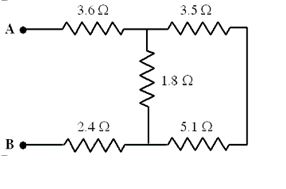
-What is the current through the 3.6- resistor?
A)1.3 A
B)3.3 A
C)6.9 A
D)7.5 A
E)25 A

-What is the current through the 3.6- resistor?
A)1.3 A
B)3.3 A
C)6.9 A
D)7.5 A
E)25 A

Unlock Deck
Unlock for access to all 100 flashcards in this deck.
Unlock Deck
k this deck
62
How much energy is stored in the combination of capacitors shown? 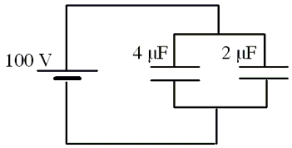
A)0.01 J
B)0.02 J
C)0.03 J
D)0.04 J
E)0.05 J

A)0.01 J
B)0.02 J
C)0.03 J
D)0.04 J
E)0.05 J

Unlock Deck
Unlock for access to all 100 flashcards in this deck.
Unlock Deck
k this deck
63
When two capacitors are connected in series, the equivalent capacitance of the combination is 120 µF. When the two are connected in parallel, however, the equivalent capacitance is 480 µF. What are the capacitances of the individual capacitors?
A)240 µF and 240 µF
B)125 µF and 325 µF
C)175 µF and 275 µF
D)150 µF and 300 µF
E)80 µF and 370 µF
A)240 µF and 240 µF
B)125 µF and 325 µF
C)175 µF and 275 µF
D)150 µF and 300 µF
E)80 µF and 370 µF

Unlock Deck
Unlock for access to all 100 flashcards in this deck.
Unlock Deck
k this deck
64
Five resistors are connected as shown in the diagram. The potential difference between points A and B is 15 V. 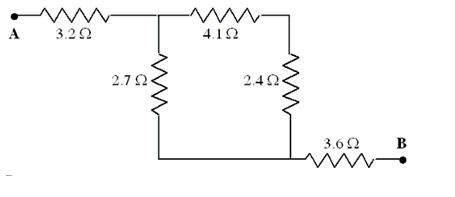
-What is the current in the 2.7- resistor?
A)12 A
B)0.8 A
C)2.2 A
D)0.4 A
E)1.2 A

-What is the current in the 2.7- resistor?
A)12 A
B)0.8 A
C)2.2 A
D)0.4 A
E)1.2 A

Unlock Deck
Unlock for access to all 100 flashcards in this deck.
Unlock Deck
k this deck
65
Five resistors are connected as shown in the diagram. The potential difference between points A and B is 25 V. 
-How much energy is dissipated in the 1.8- resistor in 4.0 seconds?
A)18 J
B)28 J
C)55 J
D)64 J
E)93 J

-How much energy is dissipated in the 1.8- resistor in 4.0 seconds?
A)18 J
B)28 J
C)55 J
D)64 J
E)93 J

Unlock Deck
Unlock for access to all 100 flashcards in this deck.
Unlock Deck
k this deck
66
Three resistors and two batteries are connected as shown in the circuit diagram. What is the magnitude of the current through the 12-V battery? 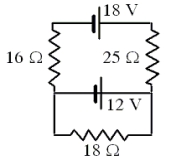
A)0.15 A
B)0.82 A
C)0.30 A
D)0.67 A
E)0.52 A

A)0.15 A
B)0.82 A
C)0.30 A
D)0.67 A
E)0.52 A

Unlock Deck
Unlock for access to all 100 flashcards in this deck.
Unlock Deck
k this deck
67
What is the equivalent capacitance of the combination of capacitors shown in the circuit? 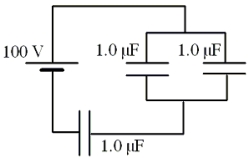
A)0.37 µF
B)3.3 µF
C)4.6 µF
D)0.67 µF
E)2.1 µF

A)0.37 µF
B)3.3 µF
C)4.6 µF
D)0.67 µF
E)2.1 µF

Unlock Deck
Unlock for access to all 100 flashcards in this deck.
Unlock Deck
k this deck
68
Five resistors are connected as shown in the diagram. The potential difference between points A and B is 25 V. 
-What is the equivalent resistance between the points A and B?
A)1.5
B)4.8
C)7.5
D)9.4
E)11

-What is the equivalent resistance between the points A and B?
A)1.5
B)4.8
C)7.5
D)9.4
E)11

Unlock Deck
Unlock for access to all 100 flashcards in this deck.
Unlock Deck
k this deck
69
Five resistors are connected as shown in the diagram. The potential difference between points A and B is 15 V. 
-What is the current in the 3.6- resistor?
A)1.3 A
B)1.7 A
C)2.9 A
D)3.5 A
E)15 A

-What is the current in the 3.6- resistor?
A)1.3 A
B)1.7 A
C)2.9 A
D)3.5 A
E)15 A

Unlock Deck
Unlock for access to all 100 flashcards in this deck.
Unlock Deck
k this deck
70
A 10.0-µF capacitor is charged so that the potential difference between its plates is 10.0 V.
A 5.0-µF capacitor is similarly charged so that the potential difference between its plates is 5.0 V.
The two charged capacitors are then connected to each other in parallel with positive plate connected to positive plate and negative plate connected to negative plate.
-How much charge flows from one capacitor to the other when the capacitors are connected?
A)17 C
B)33 C
C)67 C
D)83 C
E)zero coulombs
A 5.0-µF capacitor is similarly charged so that the potential difference between its plates is 5.0 V.
The two charged capacitors are then connected to each other in parallel with positive plate connected to positive plate and negative plate connected to negative plate.
-How much charge flows from one capacitor to the other when the capacitors are connected?
A)17 C
B)33 C
C)67 C
D)83 C
E)zero coulombs

Unlock Deck
Unlock for access to all 100 flashcards in this deck.
Unlock Deck
k this deck
71
Three parallel plate capacitors, each having a capacitance of 1.0 µF are connected in parallel. The potential difference across the combination is 100 V. What is the charge on any one of the capacitors?
A)30 C
B)100 C
C)300 C
D)1000 C
E)3000 C
A)30 C
B)100 C
C)300 C
D)1000 C
E)3000 C

Unlock Deck
Unlock for access to all 100 flashcards in this deck.
Unlock Deck
k this deck
72
Determine the power dissipated by the 40- resistor in the circuit shown. 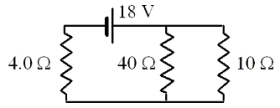
A)3.6 W
B)4.5 W
C)9.0 W
D)14 W
E)27 W

A)3.6 W
B)4.5 W
C)9.0 W
D)14 W
E)27 W

Unlock Deck
Unlock for access to all 100 flashcards in this deck.
Unlock Deck
k this deck
73
Three parallel plate capacitors, each having a capacitance of 1.0 µF are connected in parallel. The potential difference across the combination is 100 V. What is the equivalent capacitance of this combination?
A)0.3 F
B)1 F
C)3 F
D)6 F
E)30 F
A)0.3 F
B)1 F
C)3 F
D)6 F
E)30 F

Unlock Deck
Unlock for access to all 100 flashcards in this deck.
Unlock Deck
k this deck
74
Which one of the following statements concerning capacitors of unequal capacitance connected in series is true?
A)Each capacitor holds a different amount of charge.
B)The equivalent capacitance of the circuit is the sum of the individual capacitances.
C)The total voltage supplied by the battery is the sum of the voltages across each capacitor.
D)The total positive charge in the circuit is the sum of the positive charges on each capacitor.
E)The total voltage supplied by the battery is equal to the average voltage across all the capacitors.
A)Each capacitor holds a different amount of charge.
B)The equivalent capacitance of the circuit is the sum of the individual capacitances.
C)The total voltage supplied by the battery is the sum of the voltages across each capacitor.
D)The total positive charge in the circuit is the sum of the positive charges on each capacitor.
E)The total voltage supplied by the battery is equal to the average voltage across all the capacitors.

Unlock Deck
Unlock for access to all 100 flashcards in this deck.
Unlock Deck
k this deck
75
Five resistors are connected as shown in the diagram. The potential difference between points A and B is 15 V. 
-What amount of energy is dissipated in the 2.7- resistor in 9.0 seconds?
A)15 J
B)24 J
C)29 J
D)36 J
E)52 J

-What amount of energy is dissipated in the 2.7- resistor in 9.0 seconds?
A)15 J
B)24 J
C)29 J
D)36 J
E)52 J

Unlock Deck
Unlock for access to all 100 flashcards in this deck.
Unlock Deck
k this deck
76
A 3.0-µF capacitor is connected in series with a 4.0-µF capacitor and a 48-V battery. What quantity of charge is supplied by the battery to charge the capacitors?
A)3.4 × 10-4 C
B)7.3 × 10-4 C
C)3.0 × 10-5 C
D)8.2 × 10-5 C
E)1.8 × 10-6 C
A)3.4 × 10-4 C
B)7.3 × 10-4 C
C)3.0 × 10-5 C
D)8.2 × 10-5 C
E)1.8 × 10-6 C

Unlock Deck
Unlock for access to all 100 flashcards in this deck.
Unlock Deck
k this deck
77
Five resistors are connected as shown in the diagram. The potential difference between points A and B is 25 V. 
-What is the potential drop across the 3.5- resistor?
A)2.0 V
B)5.0 V
C)8.0 V
D)17 V
E)25 V

-What is the potential drop across the 3.5- resistor?
A)2.0 V
B)5.0 V
C)8.0 V
D)17 V
E)25 V

Unlock Deck
Unlock for access to all 100 flashcards in this deck.
Unlock Deck
k this deck
78
Five resistors are connected as shown in the diagram. The potential difference between points A and B is 25 V. 
-What is the current through the 1.8- resistor?
A)2.8 A
B)3.3 A
C)5.6 A
D)6.9 A
E)14 A

-What is the current through the 1.8- resistor?
A)2.8 A
B)3.3 A
C)5.6 A
D)6.9 A
E)14 A

Unlock Deck
Unlock for access to all 100 flashcards in this deck.
Unlock Deck
k this deck
79
Five resistors are connected as shown in the diagram. The potential difference between points A and B is 15 V. 
-What is the equivalent resistance between the points A and B?
A)1.5
B)4.8
C)8.7
D)10.4
E)11.1

-What is the equivalent resistance between the points A and B?
A)1.5
B)4.8
C)8.7
D)10.4
E)11.1

Unlock Deck
Unlock for access to all 100 flashcards in this deck.
Unlock Deck
k this deck
80
A battery supplies a total charge of 5.0 C to a circuit that consists of a series combination of two identical capacitors, each with capacitance C. Determine the charge on either capacitor.
A)5.0 C
B)2.5 C
C)1.5 C
D)1.0 C
E)0.50 C
A)5.0 C
B)2.5 C
C)1.5 C
D)1.0 C
E)0.50 C

Unlock Deck
Unlock for access to all 100 flashcards in this deck.
Unlock Deck
k this deck


